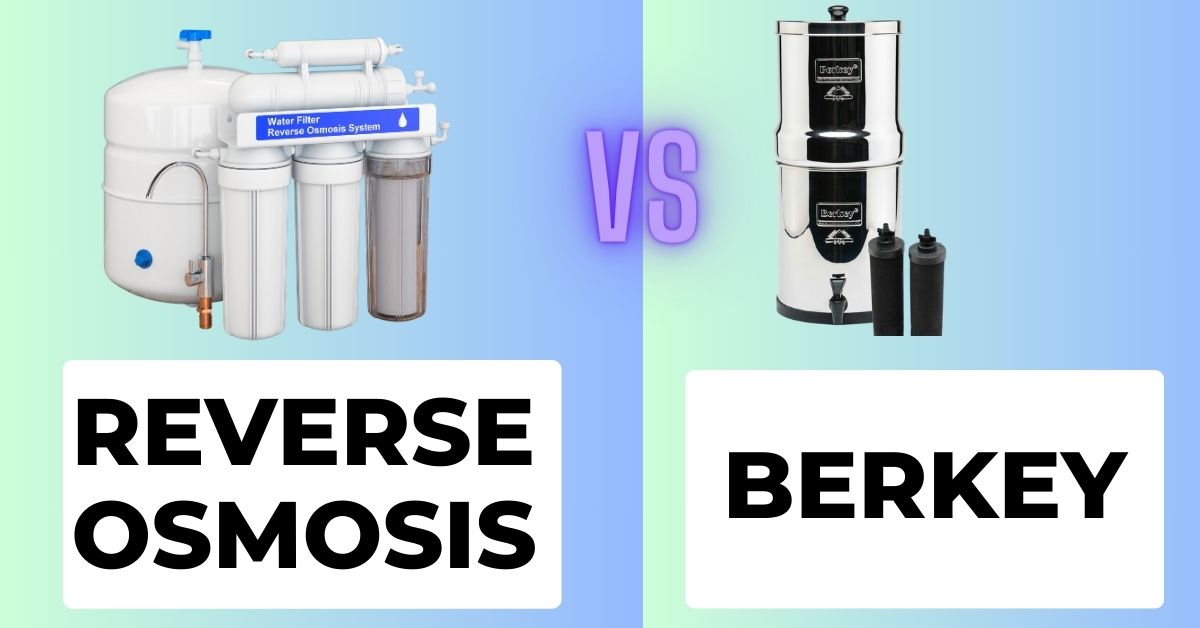The debate between reverse osmosis vs Berkey water filtration systems is one that has been ongoing for years. Both types of filtration systems offer unique advantages and disadvantages, and choosing the one that best meets your needs is important.
Understanding the differences between reverse osmosis and Berkey can help you make an informed decision.
Reverse osmosis is a type of water filtration system that uses a semi-permeable membrane to remove contaminants from your water. It removes nearly all contaminants, including contaminants like lead and arsenic.
Berkey, on the other hand, uses a combination of different filtration technologies to remove a wide range of contaminants. Depending on the type of Berkey filter you choose, it can remove bacteria, parasites, and even fluoride.
In this blog post, we’ll discuss the pros and cons of each type of filtration system, so you can make an educated decision when purchasing a water filtration system.
Reverse osmosis (RO) is a water purification technology that uses a membrane to remove contaminants from water. It works by using pressure to force water through a semi-permeable membrane, which allows water molecules to pass through but removes larger contaminants.
The process of reverse osmosis begins when water is fed into the system through a pre-filter, which removes any large particles or sediment that could clog the membrane. The water then flows through a membrane housing unit, where it is subjected to high pressure.
This pressure forces the water through the semi-permeable membrane, which acts as a filter to remove contaminants.
The purified water is collected on the other side of the membrane, while the contaminants and any remaining impurities are rejected and washed away. The purified water is then collected in a storage tank and can be dispensed through a faucet or used for other purposes.
Reverse osmosis systems are effective at removing a wide range of contaminants from water, including bacteria, viruses, chemicals, and heavy metals.
They are often used in households and businesses to provide clean, safe drinking water and can be used in a variety of settings, including homes, offices, and industrial facilities
Berkey water purification systems use a combination of filtration and purification technologies to remove contaminants from water. The systems typically consist of one or more filter elements that are housed in a container, along with a spigot for dispensing the purified water.
To use a Berkey system, water is poured into the top of the container, where it flows through the filter elements. The filter elements are made of a porous, absorbent material that removes contaminants from the water as it passes through. The purified water is then collected in a lower chamber and can be dispensed through the spigot.
The specific filtration and purification technologies used in Berkey systems vary depending on the model. Some systems use a combination of gravity filtration and carbon filtration, while others use ceramic filters or other types of filter media.
Some Berkey systems also include additional purification technologies, such as UV light or ozone, to further remove contaminants.
Overall, Berkey water purification systems are designed to effectively remove a wide range of contaminants from water, including bacteria, viruses, parasites, chemicals, and heavy metals.
They are often used in situations where access to clean drinking water is limited, such as during emergencies or when traveling.
Reverse osmosis is a process of water filtration that removes most impurities from water, leaving it clean and pure. While it is a popular choice for many households, there are some pros and cons associated with this method.
Many water purifying systems exist, but two of the most popular are reverse osmosis and Berkey. Both of these systems have their own strengths and weaknesses, so it can be hard to choose which one is right for you. Let’s look at the pros and cons of Berkey.
When it comes to reverse osmosis and berkey filtration systems, both offer the same basic filtration benefits. However, the cost of each system can vary greatly depending on the type and size of the unit.
For instance, a reverse osmosis system can cost anywhere from $100 to $500, while a berkey filtration system can range from $250 to $1,000.
Additionally, reverse osmosis systems tend to require frequent filter changes and maintenance, while berkey systems require less maintenance and fewer filter changes. In the end, the cost of each type of filtration system depends on the size and type of unit that you choose.
In conclusion, Here are a few more crucial things to think about while making your decision to buy a reverse osmosis or Berkey filter.
Going ahead, keep these things in mind while deciding which filter would be ideal to buy.
